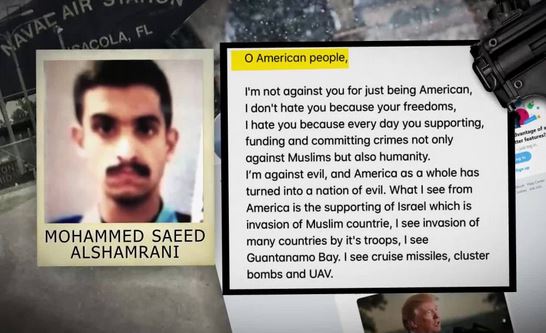December 16, 2019 "Information
Clearing House" - One might
postulate that the United States is regularly supporting
so-called allies whose very nature will eventually
generate blowback that will do terrible damage to actual
American interests. The recent example of the
mass shooting at the Pensacola Naval Air Station in
Florida by Saudi Second Lieutenant Mohammed Alshamrani
is illustrative. Alshamrani killed three American
sailors while three other Saudi students filmed what was
taking place, presumably for posting on social media.
Though the U.S. and The Kingdom of Saudi Arabia
have no actual alliance, the American and Saudi
militaries have a relationship that began during the
Second World War. Currently, Washington supports Riyadh
as a force multiplier and extension of U.S. power in the
Persian Gulf region to serve as a check on what if
perceives to be as hostile Iran. Saudi Arabia, nurturing
its own regional ambitions, clearly sees Iran as its
principal enemy. As the White House also appears keen to
do whatever is necessary to
bring about regime change in Tehran, the tendency in
Washington to serve as an apologist for whatever Riyadh
does will continue for the foreseeable future. And, as
an added bonus, the Saudis buy billions of dollars’
worth of American made weapons annually.
Someone has to train the people who fly the expensive
warplanes, so Saudi Air Force “students” are sent to
American bases like Pensacola where they undergo
language and flight training that is normally conducted
by civilian contractors. The student pilots, surely
carefully screened by Saudi security, would be unlikely
candidates for staging a terrorist attack in the United
States, but the Alshamrani incident suggests that there
is more dissidence bubbling beneath the surface than is
apparent from the rosy assurances about The Kingdom
coming out of the White House and the Royal Palace in
Riyadh.
The investigation of Alshamrani continues, but
it seems clear that he was unhappy with aspects of
America’s pro-Israel and interventionist foreign policy.
He also connected with
radical websites on social media and his colleagues
report that he would periodically return to the U.S.
from home leave in Saudi Arabia “more religious.” On the
night before the incident, he showed a film that
included a mass shooting.

Alshamrani is just one element in the
considerable potential downside inherent in the
undeclared bilateral relationship. Apart from the
regional instability created by the fact that Washington
has to look the other way while the Saudis use American
weapons to carry out genocide in neighboring Yemen,
many observers believe that Saudi Arabia is
basically unstable. Its prevailing fundamentalist
Islamic sect referred to as Wahhabism is backward
looking and hostile to the United States and the West.
Some have even suggested that a large majority of
ordinary Saudis, i.e. not those who benefit from the
bilateral relationship, hate the U.S. One recalls that
fifteen out of the nineteen 9/11 hijackers were Saudi
nationals.
All of which means that the United States is training
and arming people who just might turn their training and
weapons against Washington if the al-Saud royal family
cannot stay in power. The situation is somewhat
comparable to that in Afghanistan, where so-called
“green-on-blue” incidents in which Afghan army recruits
kill their foreign trainers occur on a regular basis.
The chief difference is that should the Saudi dissidents
gain power, they would have a huge and much more
lethally sophisticated arsenal to play around with.